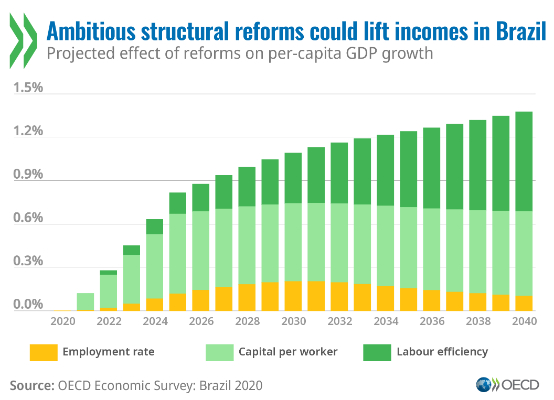Brazil: Reforms To Spur Competitiveness, Productivity And Trade Would Strengthen COVID-19 Recovery, Says OECD
Brazil was pulling out of a long recession when the COVID-19 outbreak hit, bringing the economy back into another, even deeper recession. However, swift government support has helped millions of vulnerable households, including those without formal employment and social protection. A strong and inclusive recovery from the crisis that benefits all Brazilians will require additional ambitious reforms to boost jobs, productivity and trade, as well as to strengthen public finances and improve social protection, according to a new OECD report.
The latest OECD Economic Survey of Brazil says that while the decisive response spared Brazil from a more severe economic impact, the pandemic will still significantly affect well-being and prosperity, taking a toll on people and businesses in the informal economy. The Survey estimates the COVID-19 crisis will cause GDP to shrink by 5% this year, followed by a return to growth of 2.6% in 2021 and 2.2% in 2022. Reforms to help firms to grow and compete internationally would enable Brazil to reap the benefits of integrating into global trade and to address rising poverty and inequality.

“Brazil was making good progress on structural reforms prior to the pandemic, including its successful 2019 pension reform. The shock to the economy and society from COVID-19 makes it paramount to keep momentum going and tackle outstanding barriers to competition, productivity growth and foreign trade, as well as address pressing environmental challenges,” said OECD Secretary-General Angel Gurría, presenting the Survey. “The OECD is committed to work with Brazil to ensure a strong, inclusive and sustainable recovery and to build a better future for all Brazilians.” (Read the speech in full).
The Survey estimates that an ambitious package of reforms to improve domestic regulation and competition, reduce barriers to foreign trade and improve institutions and economic governance would boost per-capita GDP growth by 0.9 percentage points per year over 15 years. Lowering trade barriers could also bring down the prices of many goods, with a tangible impact on the lives of ordinary Brazilians.
The COVID-19 crisis has accentuated the need to further lighten the cumbersome regulations, including complex procedures for taxation, which hamper entrepreneurship and competition. An average medium-sized company in Brazil spends around 1,500 hours a year on procedures to pay taxes compared to 317 hours in Latin American countries or 159 hours in OECD countries. Investment in education, vocational training and adult skills would in turn help to build a more productive workforce ready for a more globally integrated economy. Evidence suggests that adult training programmes can make a real difference for workers seeking to move into better-paying jobs, provided that course content is well-aligned with local labour market needs.
Inequality and poverty have edged up in Brazil over the last few years, reversing progress since 2000 due to strong growth, social transfers and improved education outcomes. The richest 10% of the population earn over four times that of the bottom 40%. Almost half of social benefits go to the wealthiest 20% of households. The Survey recommends better targeting transfers to those most in need, accelerating benefit concession for people who lose their jobs and withdrawing them more gradually. This would help to support the 40% of workers employed in the informal economy and not covered by unemployment schemes, and ensure an inclusive recovery from the crisis.
The efficiency of public spending should be improved, as the pandemic is adding to Brazil’s already high public debt. There is scope to make significant savings with no impact on well-being. The Survey recommends reviewing tax exemptions and subsidies that account for almost 5% of GDP and trimming civil service costs.
Brazil should also use the recovery as an opportunity to strengthen protection of the Amazon rainforest including through stronger enforcement of its forest law to stop illegal deforestation, focusing instead on the sustainable use of the Amazon’s economic potential.


 UNICEF Aotearoa NZ: Aid Cuts Threaten Fragile Progress In Ending Maternal Deaths, UN Agencies Warn
UNICEF Aotearoa NZ: Aid Cuts Threaten Fragile Progress In Ending Maternal Deaths, UN Agencies Warn Médecins Sans Frontières: Concern Over Planned Deportation Of Afghan Refugees In Pakistan
Médecins Sans Frontières: Concern Over Planned Deportation Of Afghan Refugees In Pakistan European Cultural Centre: Time Space Existence 2025 - A Collective Call To Repair, Regenerate, And Reuse
European Cultural Centre: Time Space Existence 2025 - A Collective Call To Repair, Regenerate, And Reuse John P. Ruehl, IMI: What Will Tech Moguls Do With Their Wealth?
John P. Ruehl, IMI: What Will Tech Moguls Do With Their Wealth? ITUC: Workers Must Not Pay The Price Of An Imposed Trade War
ITUC: Workers Must Not Pay The Price Of An Imposed Trade War Greenpeace: Major Deep Sea Mining Company Goes Bankrupt
Greenpeace: Major Deep Sea Mining Company Goes Bankrupt